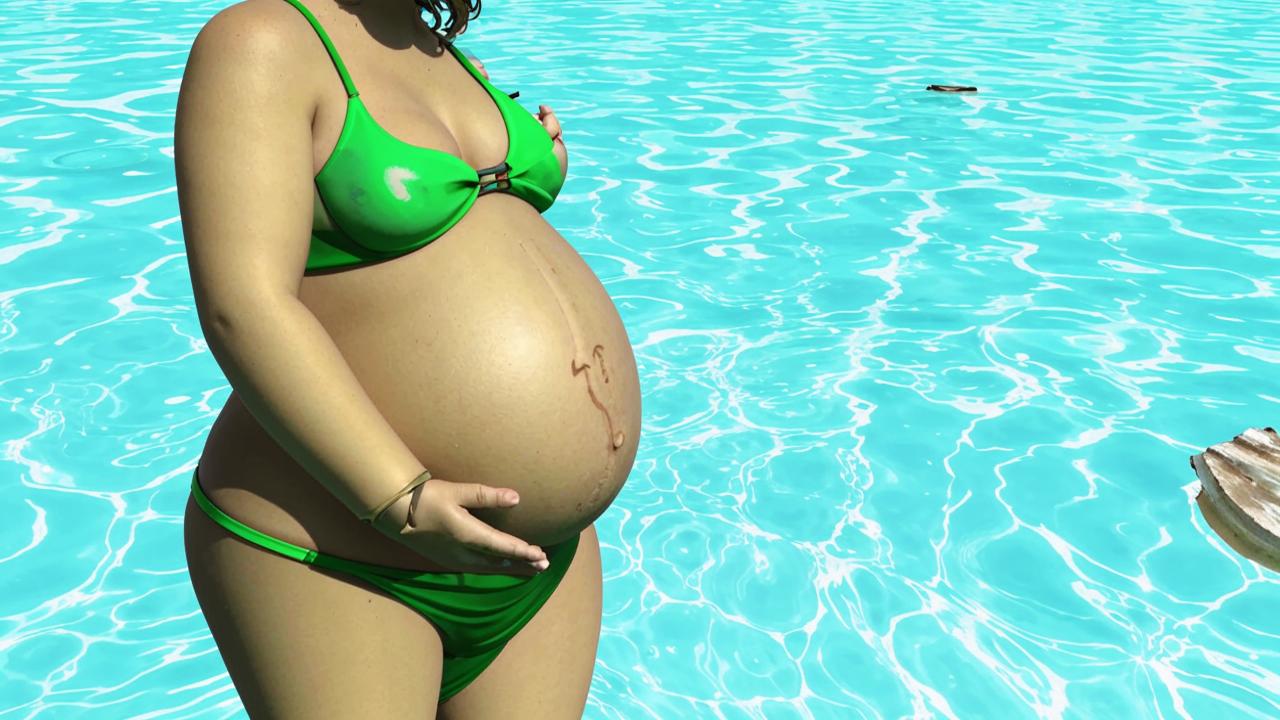Pregnant women are shown swimming in the pool in a gentle mode. It is very important to follow the doctor’s recommendations, and not to start training on your own. In the water, the body is freed from the feeling of heaviness, the load on the spine is reduced, the muscles are both toned and relaxed. During pregnancy a powerful blow falls on the lower back, and swimming relieves it.

Olga Palkina
Obstetrician-gynecologist of medical company “LabQuest” and “Q-Clinica”, ultrasound doctor
All physical activities of a pregnant woman must necessarily discuss with the doctor obstetrician-gynecologist, leading the pregnancy of the patient. And only after his approval can proceed to any kind of activity.
Benefits of swimming during pregnancy
Swimming is one of the most recommended and safe types of physical activity for pregnant women. It is a good way to prepare for childbirth. Regular exercise in the future will help you recover quickly and get back in shape. One of the advantages of swimming in the pool is that the body does not receive a dynamic load. There are no jumps, sudden movements and oscillations, which are harmful to the health of the fetus and expectant mothers.
It is also worth highlighting a few more advantages:
- Reduced stress on the joints. The weight of the growing fetus creates an additional load on the joints and ligaments of the woman, causing discomfort and soreness. Swimming allows the mom-to-be to feel lightness and freedom of movement, as the water reduces the effects of gravity.
- Improved blood circulation. Swimming helps improve blood circulation, which is especially important during pregnancy. Increased circulation delivers oxygen and nutrients to the fetus, and reduces the risk of swelling and varicose veins.
- Muscle Strengthening. Swimming is a complete physical activity that allows you to work on muscles throughout your body. Strengthening the buttocks, back and arms is especially beneficial, helping pregnant women maintain proper posture and cope with the extra weight.
- Reducing puffiness. Water has a light massage effect and helps to reduce swelling, lymphatic drainage is improved.
- Improved mood and stress reduction. Physical activity, including swimming, promotes the production of endorphins – the hormones of happiness.
- Weight control. An hour’s workout in the pool burns more than 500 kilocalories. The metabolism is accelerated, thanks to which a woman can control her weight.
- Practicing proper breathing. This is very important when preparing for childbirth. Proper breathing will make the process easier.
- Reducing the strain on the spine. During pregnancy, women often suffer from lower back pain and back pain in general. Swimming in the pool helps to solve this problem.
Before starting swimming lessons, pregnant women are advised to consult with a doctor or obstetrician. They will give recommendations and instructions, taking into account individual characteristics and the state of pregnancy.

Important factors that should be paid attention to
It is strictly contraindicated to visit the pool with violations of the biocenosis (flora) of the vagina, as it can provoke a relapse of bacterial vaginosis, which is highly undesirable in any term of pregnancy.
Before you start going to the pool, you need to get recommendations and permission from your doctor. It is better to start swimming from the second trimester. It is important to follow the rules that will make the lessons safe:
- Do not swim long distances, swimming in the pool should bring pleasure and be comfortable. It is not a marathon and not a full-fledged training for speed and endurance;
- choose shoes with non-slip soles to avoid the risk of falling;
- practice under the guidance of an instructor, especially if you have minimal or no swimming skills;
- increase the load gradually – start with 20 minutes. On average, sessions should last no more than half an hour;
- the water in the pool should be at least 22 degrees. Sharp temperature fluctuations are harmful and can provoke colds;
- do not jump from the sides or springboards into the water, enter the water gradually;
- do not stay in a wet swimsuit for a long time after exercise, as there is a risk of hypothermia;
- take a shower to wash off chlorine residue from your skin;
- do not dive or hold your breath for long periods of time.
Swimming styles that are suitable for pregnant women
There is no need to try to master complicated styles. The most optimal and comfortable are crawl and breaststroke.
Swimming breaststroke engages the hips and legs, strengthening the muscles and keeping them toned. Crawl reduces the load on the lower back, engaging the entire muscular corset.
Swimming on the back pregnant women can not – the fetus puts excessive pressure on the blood vessels, which can lead to malaise.
If the future mother can not swim or did not do sports before pregnancy, you can give preference to aqua aerobics or aqua yoga.
Features of swimming at different stages of pregnancy
First trimester. Obstetricians-gynecologists do not recommend swimming at this time, since the formation of the cervical canal begins, which protects the fetus from external bacteria. A mucous plug is formed, preventing the penetration of microorganisms into the uterine cavity. For this reason, it is better not to take risks and refuse to visit the pool.
Second trimester. The most suitable period to go to the pool.
Third trimester. During this period, you should reduce the time and intensity of the exercise. It is better to pay more attention to the correct breathing technique.

Contraindications: who can be harmed by swimming during pregnancy
Although swimming is considered safe and recommended physical activity for pregnant women, there are several contraindications that should be taken into account:
- there is a threat of pregnancy termination and risk of premature labor;
- Preeclampsia is a pathological condition that occurs in the second half of pregnancy. It is characterized by high blood pressure, severe swelling and protein content in the urine;
- infections and diseases. If a woman is found to have an active infection, swimming may exacerbate symptoms or cause it to spread. Swimming should also be avoided if you have a high body temperature, fever or other painful conditions.
- Allergies and sensitivity to chlorine. Some pregnant women are sensitive to the chlorine used to treat pool water. An allergy to chlorine causes irritation of the skin, eyes, or respiratory tract.
- Severe toxicosis, depressing the general condition and lowering the immune system;
- bloody discharge and discomfort in the lower abdomen;
- high blood pressure and general malaise.
Swimming at a gentle slow pace is good for the health of pregnant women. Such activities reduce the load on the spine and joints, improve blood circulation and lymphatic drainage, strengthen muscles and relax spasmed ligaments, reduce swelling and improve mood.
However, if a woman has serious health problems such as high blood pressure, premature labor, preeclampsia or other pregnancy complications, swimming is contraindicated. Before you start going to the pool, you need to get recommendations from a doctor. Only he will be able to assess the condition and individual characteristics of the future mother and fetus.





